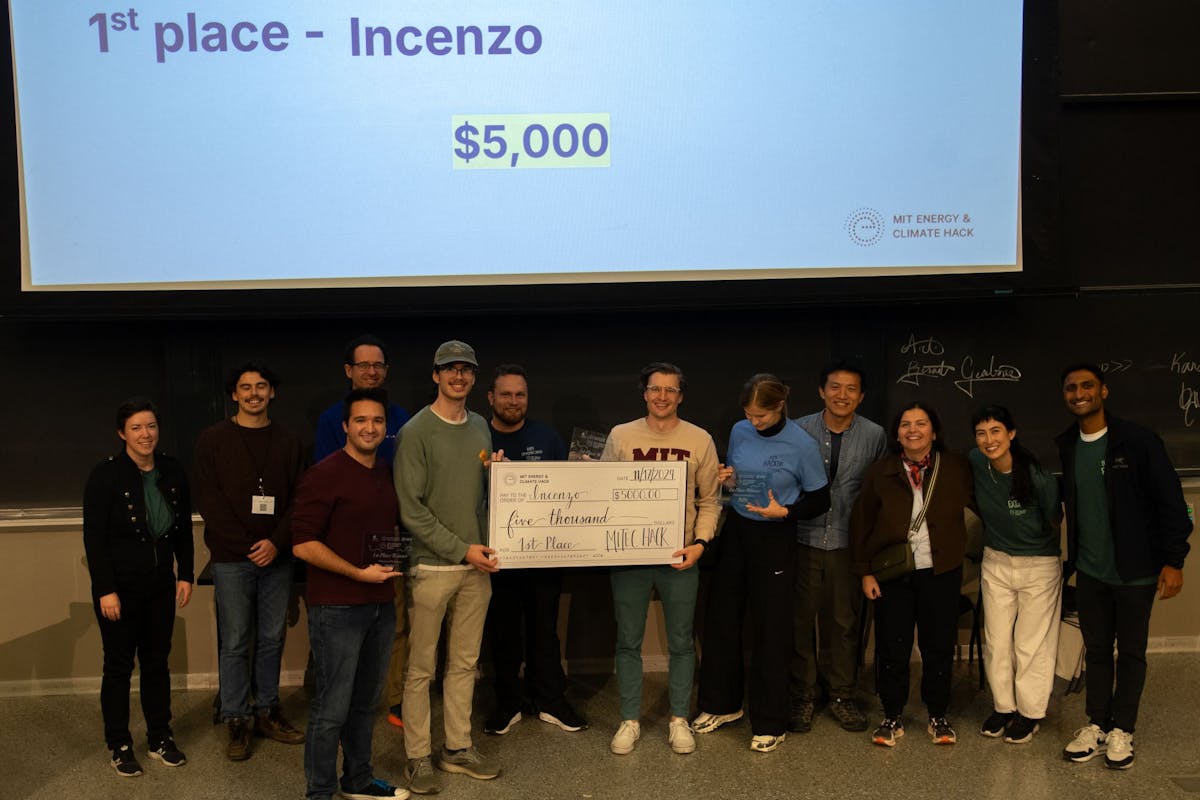Cambridge, MA
At the 10th annual MIT Climate & Energy Hackathon, November 15-17 2024, 60 teams competed to win the top prize. The first place team built their solution on top of Palmetto’s soon-to-be-released Energy Intelligence API.
A cross-disciplinary team from MIT’s Sloan School of Management* and a range of graduate engineering programs, this year’s winners developed a platform they called “Incenzo,” whose purpose is to help governments, utilities, and other organizations accurately target homes for inclusion in home energy upgrade incentive programs like MassSave.
The Palmetto Energy Intelligence API was foundational to this project. The students used US Census and IRS data to identify areas likely to contain low-income homes. They then sent those locations to the Palmetto API, which estimates how much energy those homes use today and how much energy they could save with green upgrades like solar panels and heat pumps. The students also used the API to estimate how much money households could save by making these upgrades.
“The outputs we created with Palmetto's digital twin allowed us to turn high-level policies and building features into detailed findings.” — Team Incenzo
A panel of industry leaders and MIT professors selected the winning pitches based on creativity, scope, and potential for impact, among other criteria. Judge Dr. Yuly Fuentes-Medel noted that this year’s top team stood out especially for the potential impact of the solution they delivered.
$8B of federal tax credits will be claimed by individuals through the IRA, and many states have their own funds set up to incentivize homeowners to make efficient home upgrades as well. The winners explained that while higher-income households are more likely to have the time and resources to take advantage of the programs distributing these incentives, lower-income households are less likely to know they exist. Accurate targeting tools like the team developed with the Palmetto API solve the problem by putting information in the hands of the governments, contractors, and other parties who can then accurately target homes that are both eligible for these programs and have the highest potential to save energy.
The team behind Incenzo plans to begin holding conversations with utilities and government policy teams to gather feedback and explore pilot options for bringing the tool to market.
“We were excited by the affirmation we got from Palmetto and the finalist judges that our tool can truly help government incentive dollars get into the right hands and homes.” — Team Incenzo
The API
Palmetto’s Energy Intelligence API sits on top of a Building Energy Modeling simulation engine. The software creates digital twins of US properties that enable accurate predictions of the building’s energy usage and associated energy costs and climate impact. "The API also provides data about the building's attributes, including attributes of its envelope and appliances it contains, that inform predictions about its energy use patterns. Energy predictions are also available down to the device level.
Today, Palmetto uses this software to help homeowners understand their options for reducing their home’s energy costs. The API powers an experience that allows users of the Palmetto app to customize their home profile and get recommendations for the highest-impact and most cost-effective home energy upgrades available to them.
Palmetto plans to release this API to the general public in early 2025 and chose to sponsor this year’s Climate & Energy Hackathon at MIT as part of our beta launch. Interested readers can find the API documentation and submit interest in beta access here.
Alongside a handful of carefully selected industry design partners, MIT students became the first users outside of the company to work with the API.
The Hackathon
The hackathon provided eight different challenges the students could choose to work on. Each challenge was sponsored by a different company. Palmetto was honored to stand alongside innovative climate companies SES AI, Commonwealth Fusion, First Solar, Avangrid, Planet FWD, Galy.Co, and Ironwood Forestry.
Palmetto prompted students with the following: “Put yourself in the shoes of any type of company in the climate/energy space. What problem(s) will you solve with the data our Energy Intelligence API makes available to you?” The open-ended prompt encouraged students to be creative and to solve a real problem.
The teams who worked on Palmetto’s challenge came from a diverse range of backgrounds, and each put the API to use in innovative ways.
- One team of graduate students** used the API to create estimates of energy usage for multi-family buildings and compare that to existing and incoming Building Performance Standards. In cases where buildings risked underperforming, the team called on the Palmetto API to develop a customized plan for cost-effective energy upgrades to achieve the BPS goals.
- A team of three undergraduates used the API to develop an index score for feasibility and cost-effectiveness of setting up a microgrid.*** “As we brainstormed, we thought of how the main problem for microgrid manufacturers is that people are wary of microgrids' unreliability, if it could provide enough energy for their home, if it was suitable to install at their location, or if it truly provided more sustainable benefits than being part of a ‘macro’ grid. The API provided several insights that will be vital in revolutionizing, decarbonizing, and stabilizing our power grids in the future.”
- In the true spirit of the hackathon, one team**** hacked the API to estimate energy usage for commercial buildings, and developed a carbon trading platform for commercial building managers. This creative use isn’t officially supported by the API today, but may be in the future!
All of these teams expressed interest in continuing to work with the API, on these and other ideas, as they continue their studies and move into industry.
The MIT Connection
In addition to being a generally excellent venue for a software beta launch, MIT is also the birthplace of Mapdwell, the innovative AI startup that Palmetto acquired in 2021. The Mapdwell tech is the foundation of Palmetto’s Energy Intelligence API.
Mapdwell’s original product leveraged geospatial AI for solar design automation. Since joining Palmetto, the team has applied that expertise with geospatial and energy data to develop the digital twins and associated energy simulation software that backs the new Energy Intelligence API. We are excited to continue expanding the impact of Mapdwell — now the Energy Intelligence team — at Palmetto and expanding the capabilities in the API for our customers and partners to make use of.
What’s Next?
Palmetto is excited to release this API to the general public in early January. If you’re interested in joining the beta, you can submit interest here.
Pricing will be set on a per-call basis, but a generous free tier will enable any interested developer to get their hands on this technology. We look forward to seeing what many more teams build on top of this API.
Thank You
To the organizers of the hackathon, the judges, the volunteers who made it happen, the amazing companies who sponsored the other challenges, and the students who spent their weekends hacking with our API: thank you! You all inspire us to keep building tools that push the climate and energy space forward.
_______________
*The full Incenzo pitch can be found here. Team members: Sofie Netteberg, MIT MBA & MS in Electrical Engineering and Computer Science, Leaders for Global Operations program; Chris Johnson, MIT MBA & MS in Mechanical Engineering, Leaders for Global Operations program; Constantine Athanitis, MIT PhD in Computational Science and Engineering, Department of Materials Science and Engineering; Luc Cote, MIT PhD, Operations Research Center
**Team members: Fares Kammourieh, Carnegie Mellon University MS Energy Science, Technology & Policy; Yash Chiplunkar, Carnegie Mellon University MS Energy Science, Technology & Policy; Riya Malhotra, Carnegie Mellon University MS Building Performance and Diagnostics
***Team members: Anoushka Tamhame, MIT double major in Earth, Atmospheric, and Planetary Sciences with Finance; Logan Reich, MIT double major in Civil & Environmental Engineering with Physics; Sophie Nguyen, MIT major in Climate Systems Engineering
****Team members: Hetansh Kevadia, UMD BSc Computer Science; Pratyaksh Mishra, UMD BSc Computer Science; Rudank Singh, UMD BSc Computer Science & Mathematics

